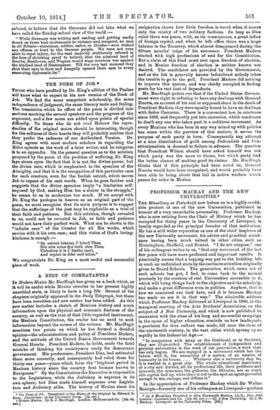THE POEM OF JOB.•
THOSE who have profited by Dr. King's edition of the Psalms will know what to expect in his new version of the Book of Job. We find the same competent scholarship, the same
independence of judgment, the same literary taste and feeling. The translation which he offers of the poem is divided into sections marking the several speakers and the progress of the
argument, and a few notes are added upon points of special difficulty. To those who do not read Hebrew the repro- duction of the original metre should be interesting, though
for the softness of their hearts they will probably confess that they prefer the cadences of our Authorized Version. Dr.
King agrees with most modern scholars in regarding the Elihu episode as the work of a later writer, and he relegates it to an appendix. On the general question as to the solution proposed by the poem of the problem of suffering, Dr. King lays stress upon the fact that it is not the divine power, but the divine care, which is emphasized in the speeches of the Almighty, and that it is the recognition of this particular care for each creature, even for the foolish ostrich, which moves Job to repent of his rash -words. When he goes farther and suggests that the divine speeches imply "a limitation self- imposed by God, making Him too a sharer in the struggle," he seems to us to modernize too much. If we accept with Dr. King the prologue in heaven as an original part of the poem, we must recognize that its main purpose is to suggest that the sufferings of the just may be explicable as a trial of their faith and patience. But this solution, though revealed to us, could not be revealed to Job, or faith and patience would not have their perfect work. What can be shown is the "infinite care" of the Creator for all His works, which carries with it his own case ; and this vision of God's loving- kindness is enough r-
" By merest hearsay I heard Thee, But n6w mine eye bath seen Thee. Therefore it is I loathe (me), And repent in ddst and ashes."
We congratulate Dr. King on a moat useful and successful piece of work.


































 Previous page
Previous page